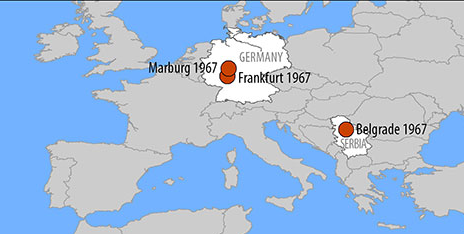Marburg virus disease is a severe, often fatal illness. It begins with flu-like symptoms but can escalate to severe vomiting, bleeding, and neurological complications. The disease is typically transmitted from bats or primates to humans and can then spread person-to-person, fueling outbreaks. Marburg virus is a type of hemorrhagic fever, caused by a virus in the same family as Ebola, known for damaging blood vessels and causing internal and external bleeding.
Tanzania is currently battling a new outbreak MVD and has reported one confirmed case and 25 suspected cases, following laboratory tests that identified the infection, raising alarm across the region. The outbreak underscores the critical need for vigilance, early detection, and robust containment measures to prevent further escalation.
How Common is Marburg Virus Disease?
While rare, Marburg virus disease outbreaks can range from a handful of cases to hundreds, making its containment critical.
Other recent and notable outbreaks
Equatorial Guinea (2023): 16 confirmed cases, 12 deaths.
Tanzania (2023): 8 confirmed cases, 5 deaths.
Historical outbreaks
Uganda (2012): 15 cases, 4 deaths.
Angola (2004–2005): 252 cases, 227 deaths.
DRC (1998–2000): 154 cases, 128 deaths (primarily in mine workers).
Germany & Yugoslavia (1967): 31 cases, 7 deaths (linked to handling African green monkeys).
What are the symptoms?
MVD symptoms typically appear in two phases:
Initial Phase (5–7 days):
Fever, chills, headache, muscle pain, sore throat, rash, and cough.
Advanced phase:
Severe abdominal pain, vomiting, diarrhea, dizziness, weight loss, and bleeding from the nose, mouth, or eyes.
Seek immediate medical attention if these symptoms arise.
What causes MVD?
The disease is caused by two viruses: Marburg virus (MARV), Ravn virus (RAVV)
Both belong to the Filoviridae family, the same as the Ebola virus.
How does the virus spread?
MVD spreads through contact with:
Infected body fluids like blood, saliva, urine, or semen.
Contaminated surfaces.
Bats or primates carrying the virus.
Risk factors include working with animals, visiting caves where fruit bats live, or caring for infected individuals.
Diagnosis and treatment
A blood test confirms the disease. Early diagnosis is critical as symptoms often mimic malaria or typhoid. Always inform healthcare providers of recent travel or exposure to outbreak areas.
Is there a cure?
Currently, no specific cure exists. Treatment focuses on supportive care, including:
Oxygen therapy.
Intravenous fluids.
Managing complications like dehydration or pain.
How can Marburg virus be prevented?
Use protective equipment (masks, gloves, goggles) when caring for patients.
Avoid contact with infected body fluids or contaminated items.
Practice safe burials: Ensure safe handling of the deceased to prevent exposure to bodily fluids.
No handshaking
Refrain from handling bush meat, bats, or primates.
Monitor for symptoms for 21 days after potential exposure and seek care immediately if symptoms develop.
If you suspect infection:
If you think you may have been exposed or experience symptoms:
Seek medical care immediately: Early treatment can save lives.
Isolate yourself: Avoid contact with others to prevent spread.
Notify local health authorities: Visit the nearest healthcare facility for evaluation.
Outlook and prognosis
What should you expect with MVD?
Patients require isolation and close monitoring. Survivors may face long-term complications, including memory issues, muscle pain, or hair loss. The virus can persist in bodily fluids like semen, so continued precautions are necessary.
Is survival possible?
With an average fatality rate of 80%, early medical care is crucial. Mortality rates vary significantly between outbreaks (24%–90%).
When to see a Doctor
If you’ve travelled to an outbreak area or had possible exposure, monitor for symptoms for 21 days. Report any symptoms immediately to healthcare providers and disclose potential exposure to facilitate early diagnosis and care.
Read more:
Tanzania confirms Marburg Virus outbreak: https://rcc.eac.int/node/150
Marburg Key Facts: Transmission, Symptoms, Diagnosis, Treatment






